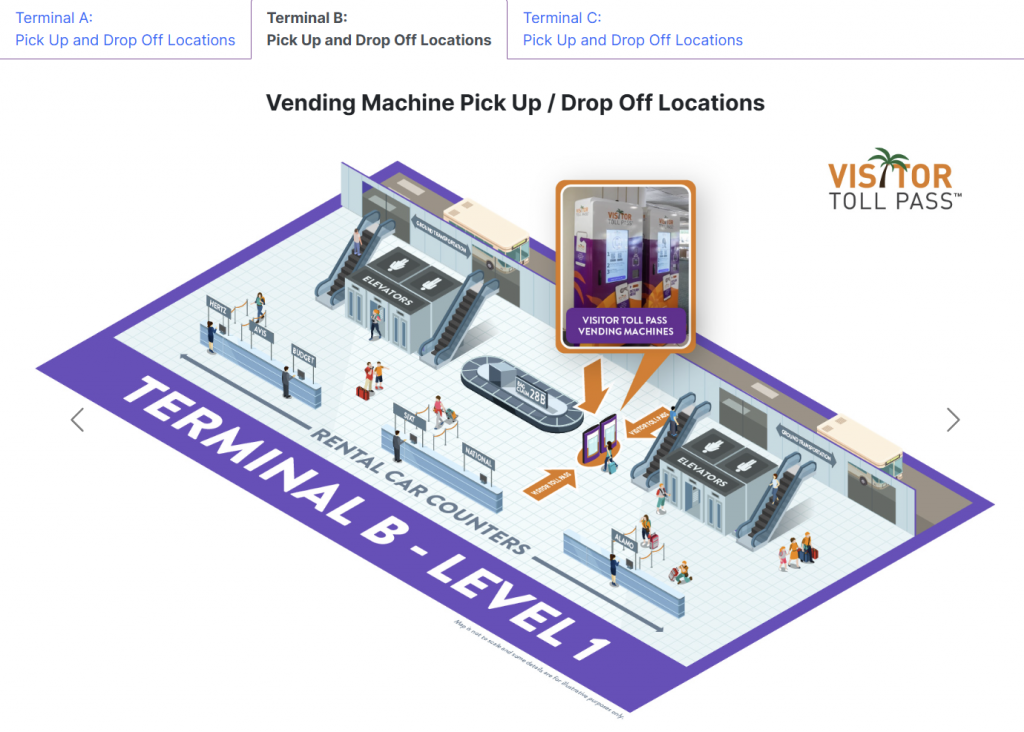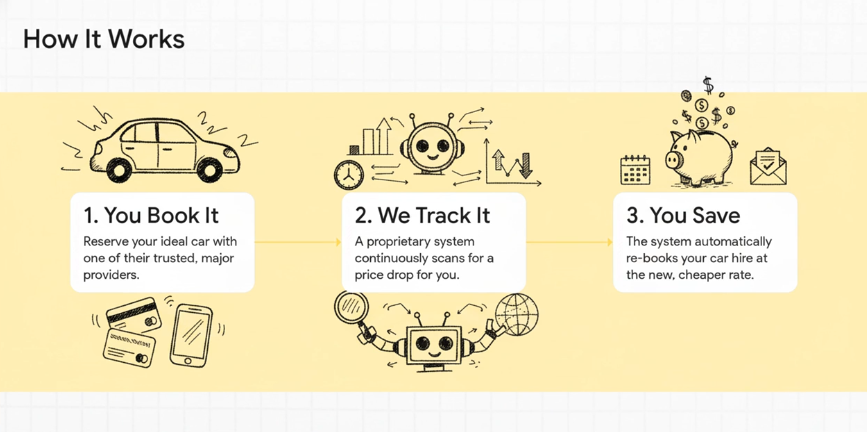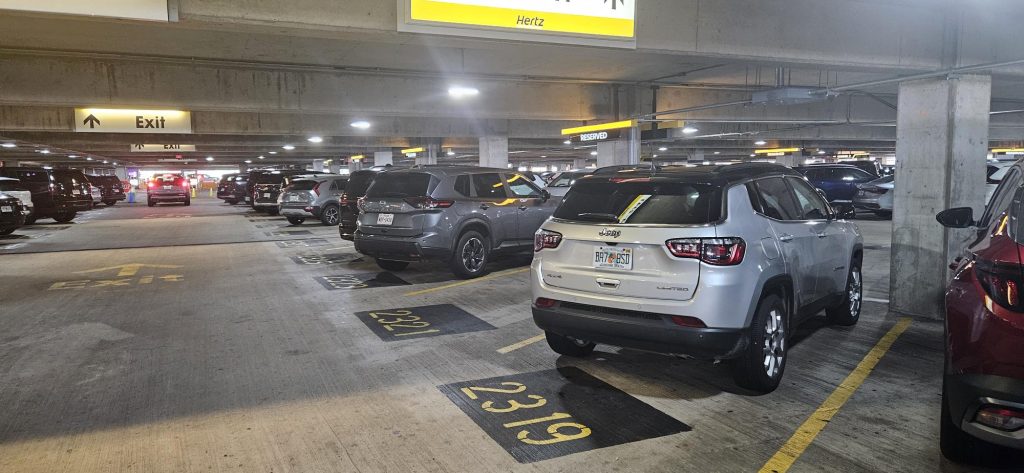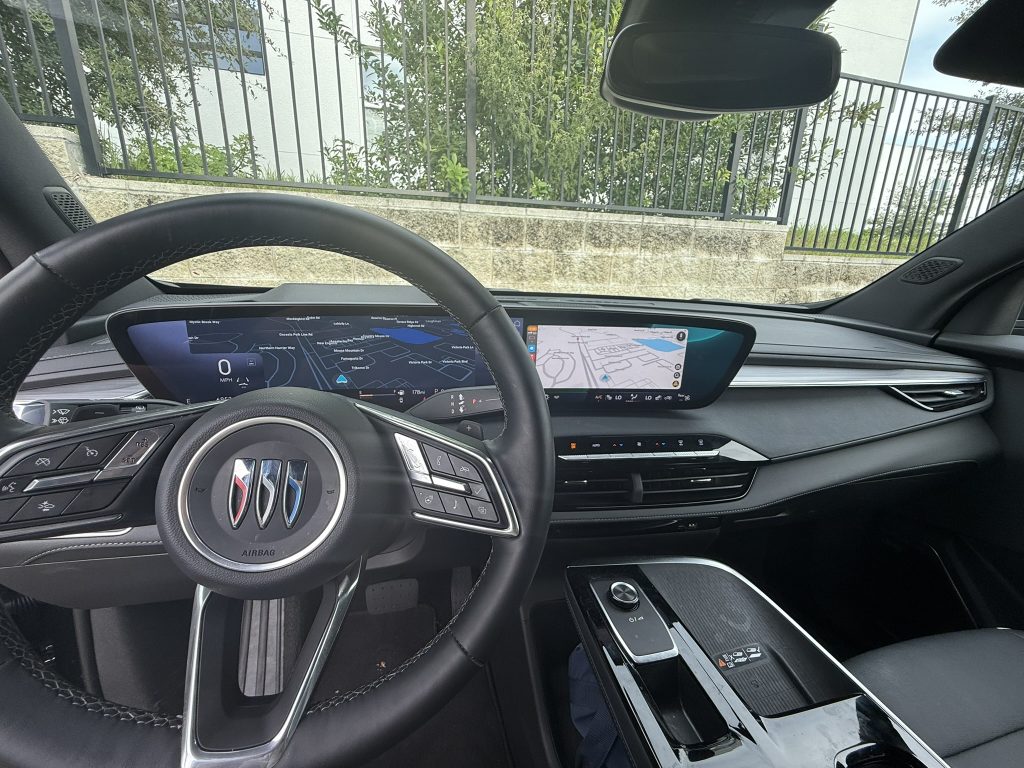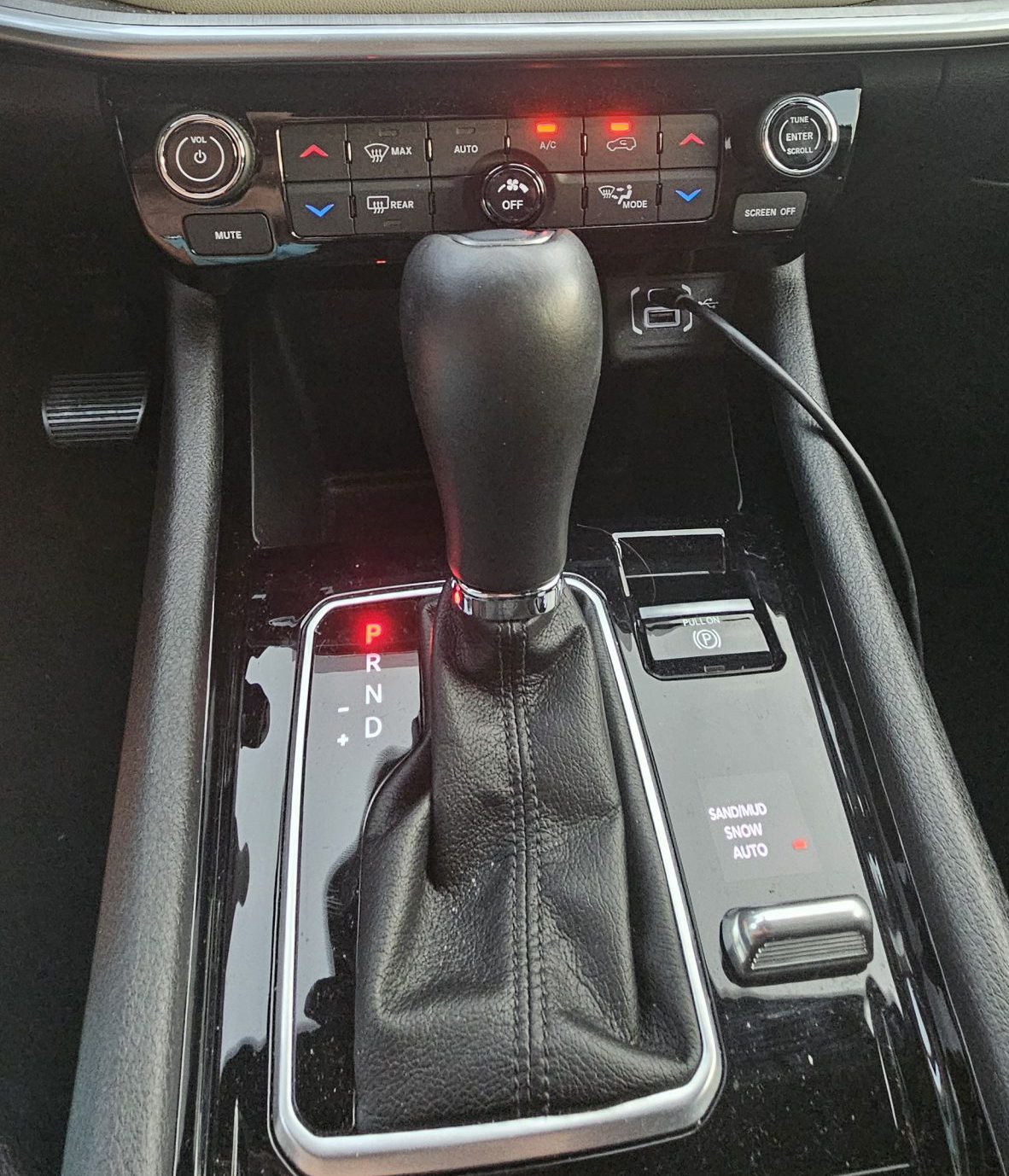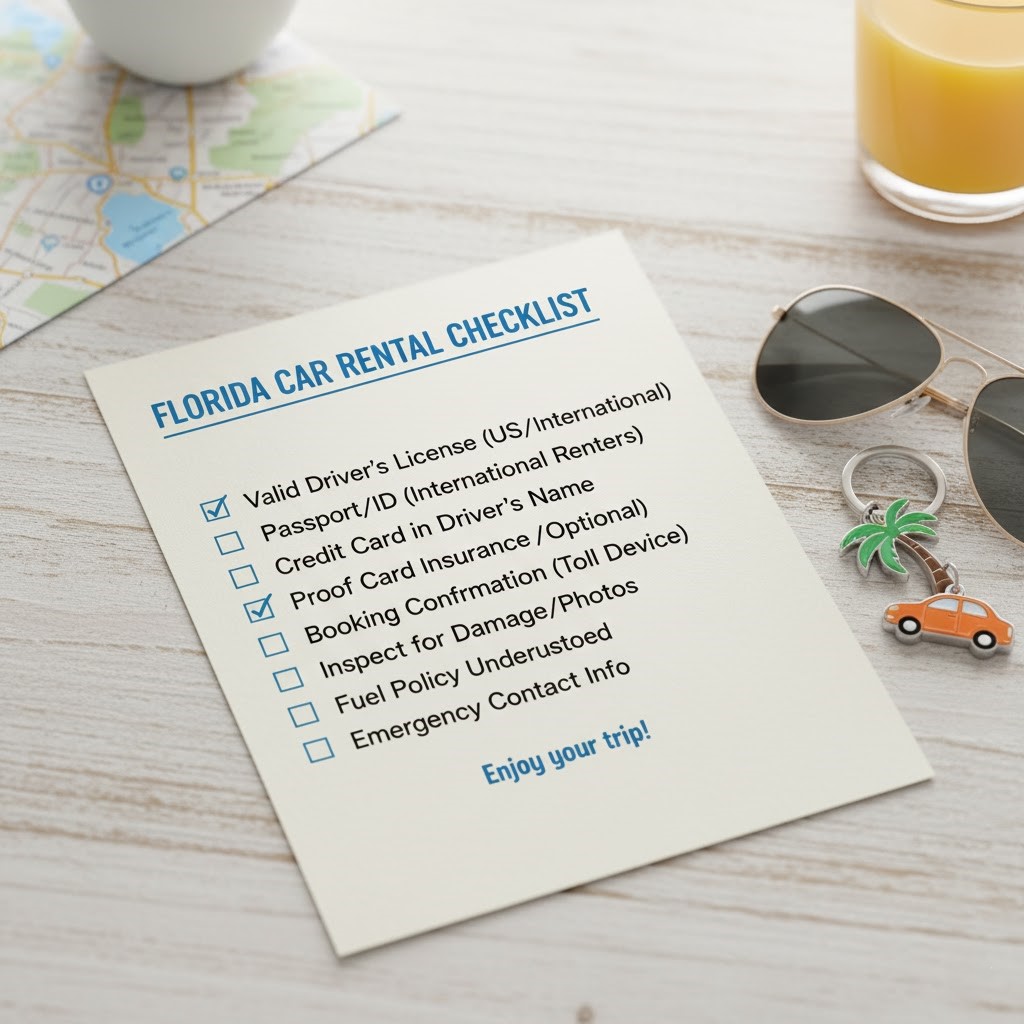Planning to drive during your Florida villa holiday? Keep in mind that Florida introduced major new traffic laws in 2025; therefore, every UK visitor must understand these changes before getting behind the wheel. This guide covers critical legal updates, penalties, and regulations. You need to know these rules to stay safe. You also need to know them to avoid hefty fines.
New to driving in Florida? See our complete guide to driving in Florida. That article covers practical tips about rental cars. It explains how to navigate traffic lights. It shows you how to use petrol stations. It covers general road rules too.
These laws affect every UK visitor who plans to drive in Florida.
Last Updated: December 2025
Before You Drive: Essential Checklist for UK Visitors
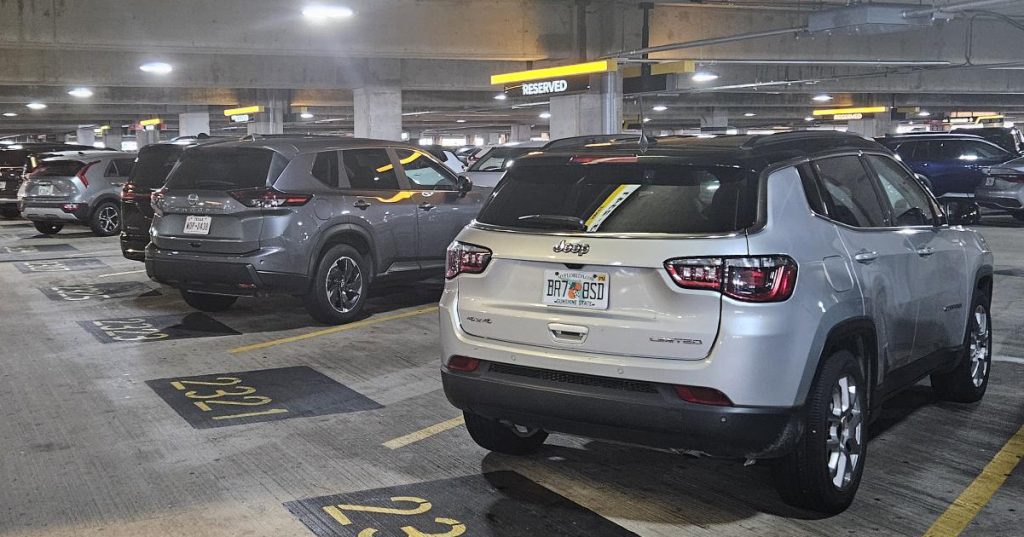
Take two minutes to complete this checklist. It prevents legal problems and keeps you safe.
✓ Before Leaving Your Florida Villa:
- □ Check your rental car licence plate is clear
- □ Programme your villa address into GPS app
- □ Remember you are now driving on the right
- □ Save emergency numbers to your phone
- □ Always carry your driving license
1.0 Introduction: Welcome to Florida – Drive Safely
Welcome to Florida from Direct Villas Florida. We want you to enjoy the Sunshine State safely. Florida recently introduced strict new traffic laws. These laws make roads safer for everyone. Consequently, you must understand these changes before you drive; otherwise, you may face significant legal issues. International visitors face the same penalties as US residents. Let’s start with the most serious law. The extreme speeding law creates criminal charges.
2.0 Florida’s Zero Tolerance Extreme Speeding Law
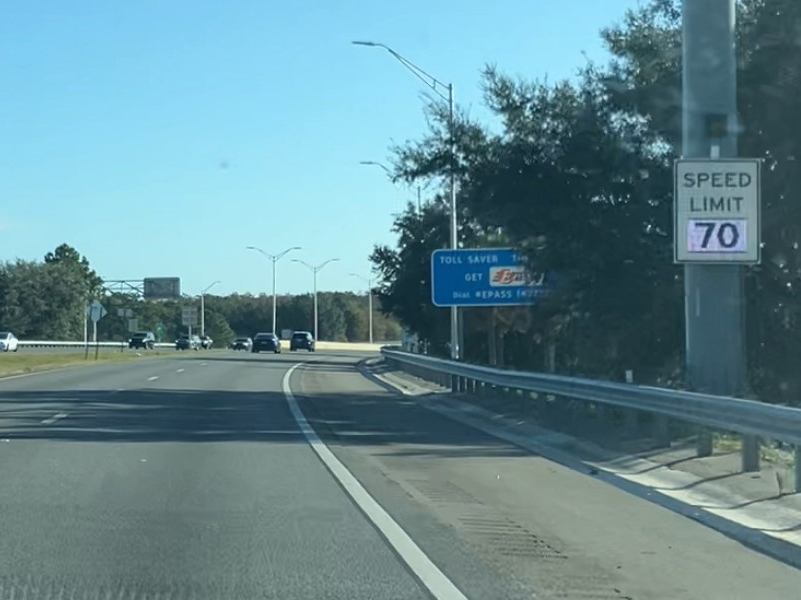
Florida now treats extreme speeding as a criminal offence. This is not a simple traffic ticket anymore. The state wants to eliminate dangerous driving behaviours. These rules start on 1st July 2025. Drivers face serious legal consequences.
The Florida Department of Highway Safety and Motor Vehicles created this law. They call it the “Super Speeder” law. It targets the most reckless drivers on Florida roads.
What Triggers Criminal Charges
Two specific actions create this criminal offence:
1. Driving 50 mph or more over the posted speed limit
- Example: Driving 115 mph in a 65 mph zone
- Example: Driving 105 mph in a 55 mph zone
2. Driving at 100 mph or higher, regardless of the speed limit
- Even on a 70 mph motorway, 100+ mph is criminal
- No exceptions exist for any circumstances
Criminal Penalties You Face
Police will require you to attend a mandatory court hearing. You cannot simply pay a fine and leave. The penalties increase dramatically if you offend again.
First Offence Penalties:
- Up to 30 days in jail
- $500 fine minimum
- Possibly both jail time and fines
- Criminal record in Florida
- Potential impact on future US visa applications
- Criminal record in Florid
Second Offence Penalties (within 5 years):
- Up to 90 days in jail
- $1,000 fine minimum
- Possibly both jail time and fines
- Likely driving licence suspension
- Enhanced criminal penalties
- Serious visa complications
Why This Matters for UK Visitors
Many UK drivers underestimate Florida speed limits. Motorways often have 70 mph limits. That feels slow compared to UK motorways. However, Florida police enforce these limits strictly. Speed cameras operate throughout Florida. Police patrol major routes constantly.
Popular routes with strict enforcement:
- I-4 corridor between Tampa and Orlando
- Florida’s Turnpike
- I-95 along the Atlantic coast
- I-75 on Florida’s west coast
- Routes to Orlando villas and theme parks
High-speed driving kills people every year. Florida created this law to protect all road users. Now let’s examine new motorway lane regulations.
3.0 Essential Motorway Lane Rules for UK Drivers
Florida introduced strict new motorway lane laws. These rules improve traffic flow throughout the state. They reduce aggressive driving incidents like tailgating. The laws help all drivers predict what others will do. This creates safer motorway conditions.
3.1 The Left Lane Rule: Passing Only
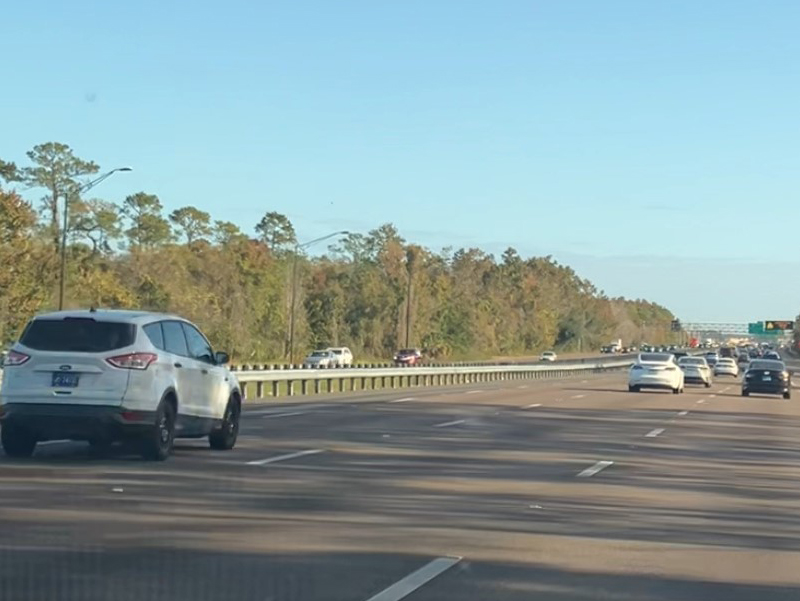
Florida now enforces a critical driving rule. You cannot stay in the far-left lane continuously. This applies on limited-access motorways only. The rule covers motorways with posted 65 mph speed limits or higher.
Key motorways where this applies:
- I-4 corridor (Tampa to Daytona Beach)
- Florida’s Turnpike (entire length)
- I-95 (Atlantic coast route)
- I-75 (Gulf coast route)
- Routes connecting Orlando villas to attractions
The rule is simple:
- Use the left lane only for passing
- Move right after you complete your overtake
- Stay in centre or right lanes otherwise
- Hogging the left lane now breaks the law
What Happens If You Break This Rule
Police issue traffic infractions for left-lane violations. These are non-criminal offences. However, they still create problems for UK visitors.
Consequences include:
- Fines typically ranging £80-£150 ($100-$200)
- Points on your Florida driving record
- Potential car hire company penalties
- Insurance complications
Exception: Heavy traffic situations where all lanes move slowly. You can stay in the left lane during genuine congestion.
3.2 The Expanded Move Over Law
Florida significantly broadened the “Move Over” law for 2025. The original law protected emergency responders only. The new version protects all stopped vehicles. This includes any vehicle displaying flashing hazard lights.
The law now covers:
- Police cars and emergency vehicles
- Ambulances and fire trucks
- Tow trucks and recovery vehicles
- Utility company vehicles
- Disabled passenger cars showing hazards
- Any vehicle with flashing warning lights
Your Legal Responsibilities
Take immediate action when you see flashing lights ahead. UK drivers often miss these situations. American roads are wider than UK roads. Vehicles on shoulders can appear suddenly.
You must do ONE of these actions:
Option 1: Move Over (Preferred)
- Change lanes to create space
- Move at least one lane away from the stopped vehicle
- Do this only when safe
- Check mirrors and blind spots carefully
- Signal your lane change clearly
Option 2: Slow Down (If You Cannot Move Over)
- Reduce speed to 20 mph below the posted limit
- Example: On a 70 mph motorway, slow to 50 mph
- Special rule for low-speed zones: If the limit is 20 mph or less, slow to 5 mph
- Maintain this reduced speed until you pass the vehicle
- Return to normal speed only after you clear the area
Move Over Law Penalties
Florida treats Move Over violations very seriously. Penalties increased significantly in recent years.
Standard violation (no accident):
- £120 ($150) fine minimum
- Three points on driving record
- Mandatory court appearance possible
Violation causing accident or injury:
- £240+ ($300+) fine
- Six points on driving record
- Possible criminal charges
- Mandatory court appearance
- Significant insurance consequences
These motorway laws improve safety for vehicles on shoulders. They also improve visibility and space around stopped vehicles. Now let’s discuss important rules about your rental car’s licence plate.
4.0 Critical Rule: The Licence Plate Frame Ban
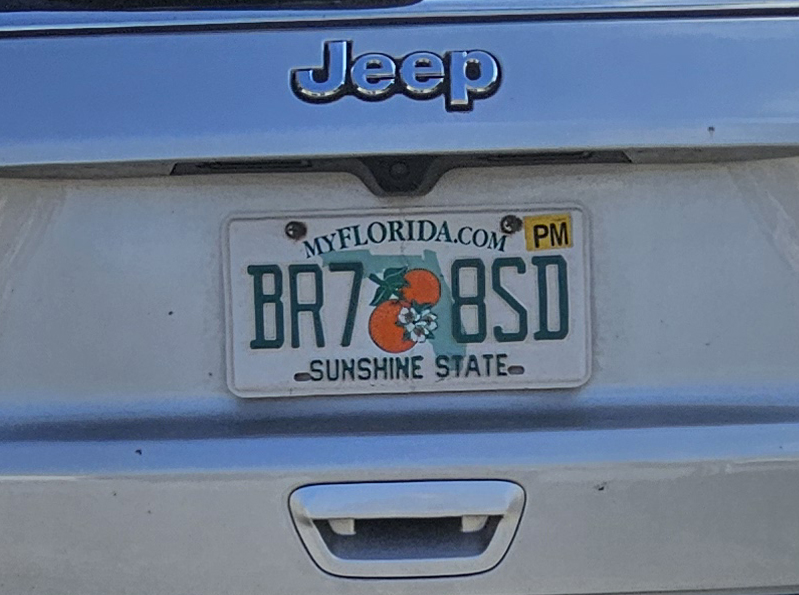
UK visitors renting cars must understand this law completely. This law matters specifically for rental vehicles. Florida wants all licence plates fully visible. Police must see them clearly. Traffic cameras must read them accurately. Rental agencies must ensure their fleets comply.
When This Law Takes Effect
The licence plate frame ban starts 1st October 2025. From that date forward, police actively enforce this rule. They check vehicles at traffic stops. They issue citations for violations.
What the Ban Prohibits
You cannot use anything that obscures any part of your licence plate. This includes common items that rental cars often have.
Banned items include:
- Licence plate frames (even partial frames)
- Plastic covers or shields
- Tinted covers
- Decorative borders
- Dealer advertising frames
- Any accessory touching the plate
Protected Licence Plate Elements
The ban specifically protects these parts. Nothing can block or obscure them.
Protected elements:
- All numbers on the plate
- All letters on the plate
- The registration sticker (usually top right corner)
- The word “Florida” at the top
- The entire plate border
- Any state symbols or graphics
Serious Legal Consequences
Florida treats licence plate violations as criminal matters. These are not simple traffic infractions.
First-level violation:
- Covering or altering a licence plate
- Classification: Second-degree misdemeanour
- Penalties: Up to £380 ($500) fine
- Possible: 60 days in jail
- Creates criminal record
Second-level violation:
- Using devices to hide plates from cameras
- Classification: Third-degree felony
- Penalties: Up to £3,800 ($5,000) fine
- Possible: 5 years in prison
- Serious criminal record
- Deportation risk for visitors
What You Must Do
Check your rental car immediately upon collection. Do this before you leave the rental agency car park. Take these specific steps.
Inspection checklist:
- Walk to the rear of your vehicle
- Examine the licence plate closely
- Look for any frames or covers
- Check the registration sticker is visible
- Verify you can read all numbers clearly
- Confirm you can see “Florida” at the top
- Ensure the entire border is visible
If you find problems:
- Return to the rental counter immediately
- Report the non-compliant licence plate
- Request they remove the frame or cover
- Do not accept the vehicle until fixed
- Document the issue with photos
- Get written confirmation of compliance
Why Rental Cars Often Have Frames
Many rental agencies historically used advertising frames. These frames displayed the company name. They also showed website addresses. However, the 2025 law bans these completely. Rental companies must remove all frames now.
Some agencies may still have old stock. They might not have updated all vehicles yet. This creates risk for you as the driver. You face the penalty, not the rental company. Always check personally before driving away.
This simple check takes one minute. It prevents serious legal problems during your Florida vacation.
5.0 Additional Important Florida Driving Laws
Florida has other driving laws UK visitors must know. These laws differ from UK regulations.
Right Turn on Red
You may turn right at red traffic lights. You must stop completely first. You must yield to all pedestrians. You must yield to cross-traffic. Look for “No Turn on Red” signs. These signs prohibit right turns.
School Zones
School zones have strictly enforced speed limits. These limits operate during school hours. Fines double in school zones. Watch for flashing yellow lights. These signal active school zones.
Mobile Phone Use
Texting whilst driving is illegal in Florida. You may use hands-free devices only. Police can stop you for phone violations. Fines start at £24 ($30) for first offence.
Seat Belts
All vehicle occupants must wear seat belts. This includes rear passengers. Front-seat violations cost £24 ($30). Rear-seat violations cost the same amount.
Child Car Seats
Children under 5 years need car seats. Specific requirements exist by age and weight. Rental companies provide child seats. Request these when booking your Florida car hire.
Frequently Asked Questions About Florida’s 2025 Driving Laws
Q: When do the new Florida driving laws take effect?
A: The Super Speeder law takes effect 1st July 2025. The licence plate frame ban starts 1st October 2025. The expanded Move Over Law is already in force. The left lane restrictions are already enforced.
Q: Will I go to jail for speeding in Florida?
A: Only if you drive 50+ mph over the limit. Or if you reach 100+ mph total speed. These extreme speeds trigger criminal charges. Possible jail time is 30 days for first offence. Second offences bring 90 days possible jail time. Regular speeding remains a traffic infraction.
Q: Can I use the left lane on Florida motorways?
A: Only for passing other vehicles on motorways. This applies to motorways with 65+ mph speed limits. You must move right after overtaking. Staying in the left lane without passing is now illegal. Police issue fines for left-lane hogging.
Q: What if my rental car has a licence plate frame?
A: Check your rental car immediately before driving away. Remove any frame or cover that obscures the plate. This includes frames obscuring any part of the numbers. It includes frames covering any part of the letters. Report non-compliant plates to your rental company. Request immediate removal or a different vehicle.
Q: Do these laws apply to UK visitors?
A: Yes, absolutely and without exception. All drivers in Florida must follow these laws. Your nationality makes no difference. UK licence holders receive no exemptions. You face the same penalties as US residents. Police enforce these laws equally for everyone.
Q: How much are the fines for breaking these new laws?
A: Super Speeder fines start at £380 ($500) minimum. First offence includes possible 30 days jail time. Second offences within 5 years cost £760 ($1,000) minimum. They include possible 90 days jail time. Left lane violations cost £80-£150 ($100-$200) typically. Licence plate violations are second-degree misdemeanours. Move Over violations cost £120+ ($150+) minimum.
Q: Can I pay fines online if I return to the UK?
A: Yes, in most cases Florida allows online payment. However, criminal offences require court appearance. Super Speeder violations need court attendance. Unpaid tickets create serious problems. They affect future US visa applications. They impact future car hire bookings. They can prevent US entry at borders.
Q: What happens if I get multiple violations?
A: Multiple violations create escalating penalties. They may trigger licence suspension. They create larger fines overall. They can prevent you from hiring cars in future. Some violations add points to Florida records. These points stay on record for years.
Q: Do speed cameras operate in Florida?
A: Yes, Florida uses automated enforcement cameras. Red light cameras are common. Some areas use speed cameras. These cameras operate 24 hours daily. They capture licence plate photos. They send tickets to rental companies. Rental companies charge your credit card. They add administrative fees too.
Q: Will these violations affect my UK driving licence?
A: Not directly in most cases. Florida cannot add points to UK licences. However, serious offences create criminal records. Criminal records can affect US travel. They can affect visa applications. They can affect travel insurance rates.
6.0 Conclusion: Stay Legal, Stay Safe
Florida created these strict laws for one clear reason. They protect everyone on Florida roads. The state protects residents daily. They also protect visitors like you.
Florida now tackles extreme speeding through criminal penalties. They improved motorway traffic flow through lane restrictions. They ensure vehicle identification through licence plate rules. These changes create demonstrably safer roads.
Follow these rules carefully. You avoid substantial fines. You avoid possible jail time. More importantly, you keep everyone safe. Your passengers stay safe. Other drivers stay safe. Pedestrians stay safe.
Drive responsibly throughout your Florida holiday. Observe speed limits at all times. Use motorway lanes correctly. Keep your licence plate completely visible. Follow the Move Over Law diligently.
First time driving in Florida? Read our complete practical guide to driving in Florida. That guide covers essential tips about rental cars. It explains navigation and GPS use. It shows you how to refuel vehicles. It covers general road rules. It discusses traffic lights and stop signs. It helps you feel comfortable behind the wheel.
Exploring Florida’s attractions? Many Orlando villas are located near major theme parks. Understanding these driving laws helps you reach attractions safely. You spend less time worrying about legal issues. You spend more time enjoying your holiday.
Enjoy your time in the Sunshine State. Drive carefully. Follow these new laws. Create wonderful memories with your family.
Book Your Florida Car Hire with Complete Confidence
Now that you understand the new Florida’s driving laws, ensure you have reliable car hire sorted. Many UK visitors waste hundreds of pounds on overpriced rentals. They don’t know where to find competitive rates. They don’t understand Florida car hire requirements.
Smarter Car Hire Florida specialises in competitive rates exclusively for UK residents. We only work with major rental providers. These include Hertz, Alamo, and Dollar. All of our rates include comprehensive coverage.
Why UK Visitors Choose Smarter Car Hire Florida
✓ Zero Deposit – Book Now, Pay Later
- You are in control
- Reserve your Florida car hire with zero deposit
- Pay your balance 6 weeks prior to collection
✓ Fully Comprehensive Insurance Included
- Complete CDW (Collision Damage Waiver)
- Full SLI (Supplementary Liability Insurance)
- Zero excess
- No hidden insurance costs at collection
✓ Free Cancellation Up to 48 Hours Before Collection
- Plans change – we understand
- Cancel without penalties up to 48 hours prior to collection
- Full refund if you cancel in time
- Modify your booking anytime
✓ 24/7 UK-Based Customer Service
- Speak to real people in the UK
- No confusing US phone numbers
- Assistance in your own time zone
- Help when you need it most
What Makes Smarter Car Hire Florida Different?
Our unique price tracking system works for you automatically. As soon as you reserve your Florida car hire, we start monitoring prices. Our system regularly checks rates using your criteria. If prices drop, you receive an email immediately. We rebook your car hire at the new lower rate. This saves you time and money automatically.
You don’t do anything. We handle everything. You simply enjoy the savings.
This happens regularly throughout the year. Prices fluctuate constantly. Most people never notice when rates drop. They lose money unnecessarily. Our system ensures you always pay the lowest available rate.
Ready to Book Your Florida Car Hire?
Get a no-obligation quote today. Compare rates from major providers. Find the perfect vehicle for your Florida villa holiday. Book with confidence knowing you have the best rate.
Smarter Car Hire Florida is owned and operated by Direct Villas UK Limited
Newham House, Dudley Road, Darlington DL1 4GG
UK Company No. 06009413
You Book It. We Track It. You Save!
Share This Guide: Help other UK visitors stay safe in Florida. Share this article on Facebook, Twitter, or email it to friends planning Florida holidays.
Need Help? Contact us through our Florida blog or visit Smarter Car Hire Florida for car hire assistance.


